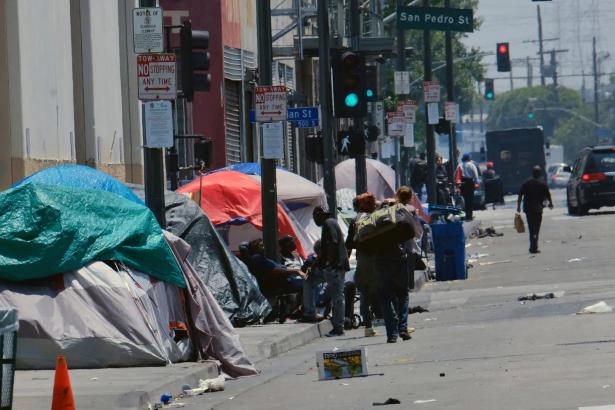Nearly half of all unhoused adults in California are over the age of 50, with Black residents dramatically overrepresented, according to the largest study of the state’s homeless population in decades.
University of California, San Francisco (UCSF) research released on Tuesday also revealed that 90% of the population lost their housing in California, with 75% of them now living in the same county where they were last housed. The study further found that nearly nine out of 10 people reported that the cost of housing was the main barrier to leaving homelessness.
The research from UCSF’s Benioff Homelessness and Housing Initiative, based on a representative survey of nearly 3,200 unhoused people, contradicts several persistent myths about the population, including that most unhoused people come from out of state to take advantage of services, as well as stereotypes that homeless people are mostly young adults who prefer to live outside and don’t want help.
“People are homeless because their rent is too high. And their options are too few. And they have no cushion,” Dr Margot Kushel, initiative director and lead investigator, told the Associated Press. “And it really makes you wonder how different things would look if we could solve that underlying problem.”
California is home to more than 171,000 people experiencing homelessness, comprising 30% of the homeless population in the US and half of all Americans who are unsheltered and living outside. The crisis has become a public health catastrophe in recent years as an aging population is forced to live in tents, cars and other makeshift shelters, with thousands dying on the streets each year. California is considered the most unaffordable state for housing, where minimum-wage earners would have to work nearly 90 hours a week to afford a one-bedroom apartment.
The study further found that among the older population, 41% said they experienced their first episode of homelessness after age 50. Most participants in the research reported that the cost of living had become unsustainable before they lost housing, reporting a monthly median household income of $960 in the six months prior to homelessness.
Nearly half of adults surveyed were not living on a lease in the six months prior to facing homelessness, meaning they were couch-surfing or had moved in with family and friends in precarious situations. Renters with leases reported a median of only 10 days’ notice that they were going to lose their housing, while people without leases reported a median of only one day of warning.
Researchers reported that participants had endured significant trauma, with two-thirds reporting mental health symptoms, more than a third experiencing physical or sexual violence during homelessness, and more than a third visiting an emergency department in the past six months. Access to care and treatment was also a major challenge cited, with one in five who use substances reporting that they wanted treatment but couldn’t obtain it.
The study found that while Black residents make up 6% of California’s general population, they account for 26% of the unhoused population. Native American and Indigenous people were also overrepresented, accounting for 12% of the unhoused population. Latinos made up 35% of the unhoused population, fairly comparable to their proportion of the general population.
The study was done at the request of California governor Gavin Newsom’s administration, but was not funded by the state.
The researchers recommended that the state increase access to housing that is affordable to extremely low-income people, including by expanding rental subsidies; expand homelessness prevention through financial support and legal assistance, including for people leaving jails, prisons and drug treatment; expand eviction protections; increase access to treatment; and increase outreach and services for people living on the streets.
Claudine Sipili, a member of the research project’s lived expertise board, said in a statement that she hopes the research will help the state develop effective strategies that allow people to transition out of homelessness and into stable housing circumstances: “Having experienced homelessness first-hand, I vividly recall the relentless fight for survival, the pervasive shame that haunted me, and my unsuccessful endeavors to overcome homelessness on my own.”
Sam Levin is a correspondent for Guardian US, based in Los Angeles. Click here for Sam's public key. Twitter @SamTLevin
The Associated Press contributed reporting


Spread the word